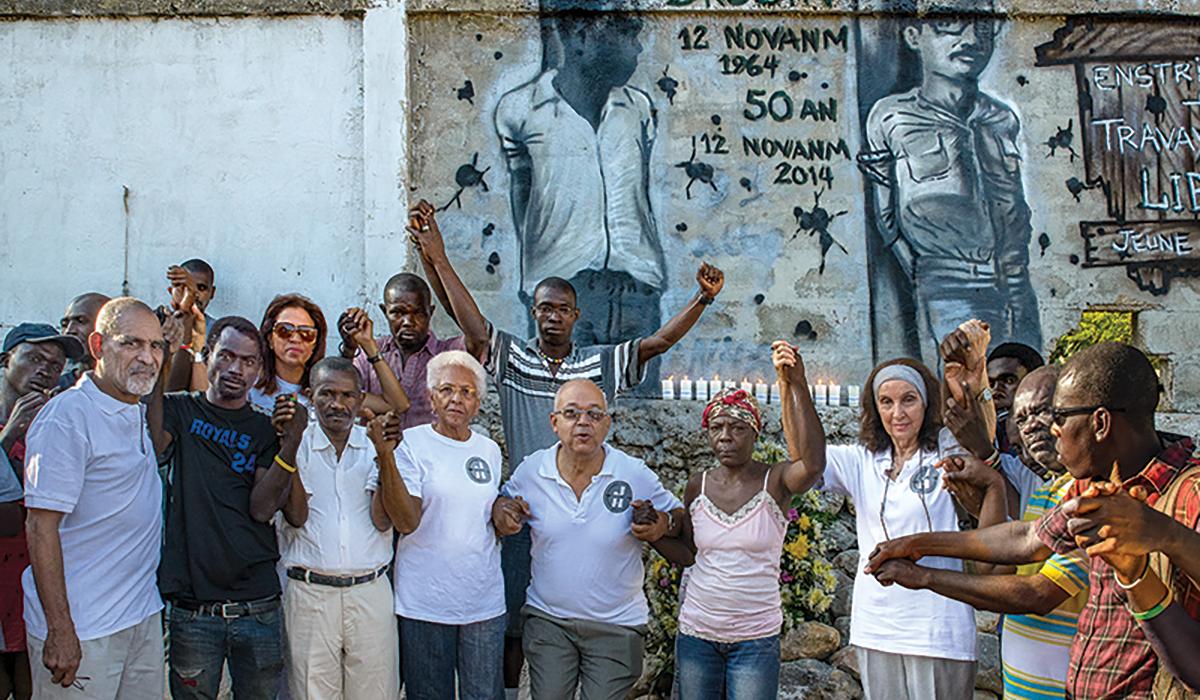July 24, 1942 — May 7, 2023
Though Sylvie Tourdot Wadestrandt Bajeux *79 faced assassination attempts, years in exile, and the death of her first husband in combat, she never stopped championing Haitian rights.
Bajeux was born in France but spent her entire adult life advocating for the people of the country she moved to as a toddler. Driven at a young age to seek justice and fight corruption in the highest levels of Haitian government, Bajeux sacrificed much for the cause.
Her first husband, Jacques Wadestrandt, was killed in 1964 — alongside other young Haitians attempting to overthrow Haiti’s despotic President François Duvalier — while Bajeux cared for their 1-year-old son, Jacques-Christian Wadestrandt.
Bajeux’s second husband, Jean-Claude Bajeux *77, was also a fervent defender of Haitian rights, and the couple dedicated their lives to political activism, despite the danger.
In 1979, they co-founded the Ecumenical Center for Human Rights, which promotes and defends human rights. In the early 2000s, Bajeux presided over a commission that investigated the corruption of Jean-Bertrand Aristide, Haiti’s president for three periods beginning in 1991.
“I think Sylvie felt very acutely the nature of injustice in Haiti,” says her friend Michael Deibert. “I think she felt she had an extreme lucidity in terms of seeing the fact that the majority of the people in Haiti were very disenfranchised from the economic and the political system.”
Bajeux felt strongly that Haiti “not build its new history on this foundation of sand, quicksand actually, without knowing its history and coming to terms with it,” says Deibert, so, in 2013, she co-founded Devoir de Mémoire, an organization committed to preserving and transmitting Haitian history and values to youth. She also headed a newsletter, La VOZ, about Haitian refugees in the Dominican Republic.
Bajeux was “in a mode of permanent mobilization for human rights,” according to a translation of comments in French sent via email by noted Haitian scholar Laënnec Hurbon. “Despite all the twists and turns of the struggles for the recovery of Haiti, Sylvie never fell into discouragement, she had hope firmly anchored within her.”
The Bajeuxs maintained that hope even as their daring work made them targets. In 1993, armed men attacked their home and beat and shot at staff, and in 2002, Bajeux was struck and knocked onto the ground by another group of armed invaders. They lived in the Dominican Republic and Puerto Rico during a decades-long exile, but in her final years, Bajeux told her son she was “afraid of nothing.”
“She was, in her own way, a revolutionary,” says Wadestrandt.
For her work, France awarded her the Legion of Honor in 2013, making her the first Haitian woman inductee.
The Bajeuxs also knew how to have fun. At Princeton, where Bajeux received a master’s in architecture and urban planning, the couple served as assistant masters of Princeton Inn (now Forbes) College, a period Wadestrandt describes as “the best time of our lives together.”
Jo Backer Laird ’75 *80 spent many evenings in their Princeton apartment playing Parcheesi, drinking Jean-Claude’s rum punch, and dancing. “I really felt that they … relished and knew how to live life better than anybody I’ve ever known,” says Laird.
“It was a hugely fun household — a lot of laughter,” says Lorraine Mangones, Bajeux’s cousin.
Wherever they lived, the Bajeuxs had an open-door policy. After an earthquake devastated Haiti in 2010, they hosted families in their backyard for months, according to Mangones, supplying tents, food, and care.
Even in her later years, Bajeux was known for her joie de vivre. Wadestrandt once took his mother, a former prima ballerina, to a boxing gym he frequented, then stepped out only to return and find her dancing salsa with his instructor.
Bajeux spent her final years in Puerto Rico and died of cardiac failure in San Juan.
Julie Bonette is PAW’s writer/assistant editor.



